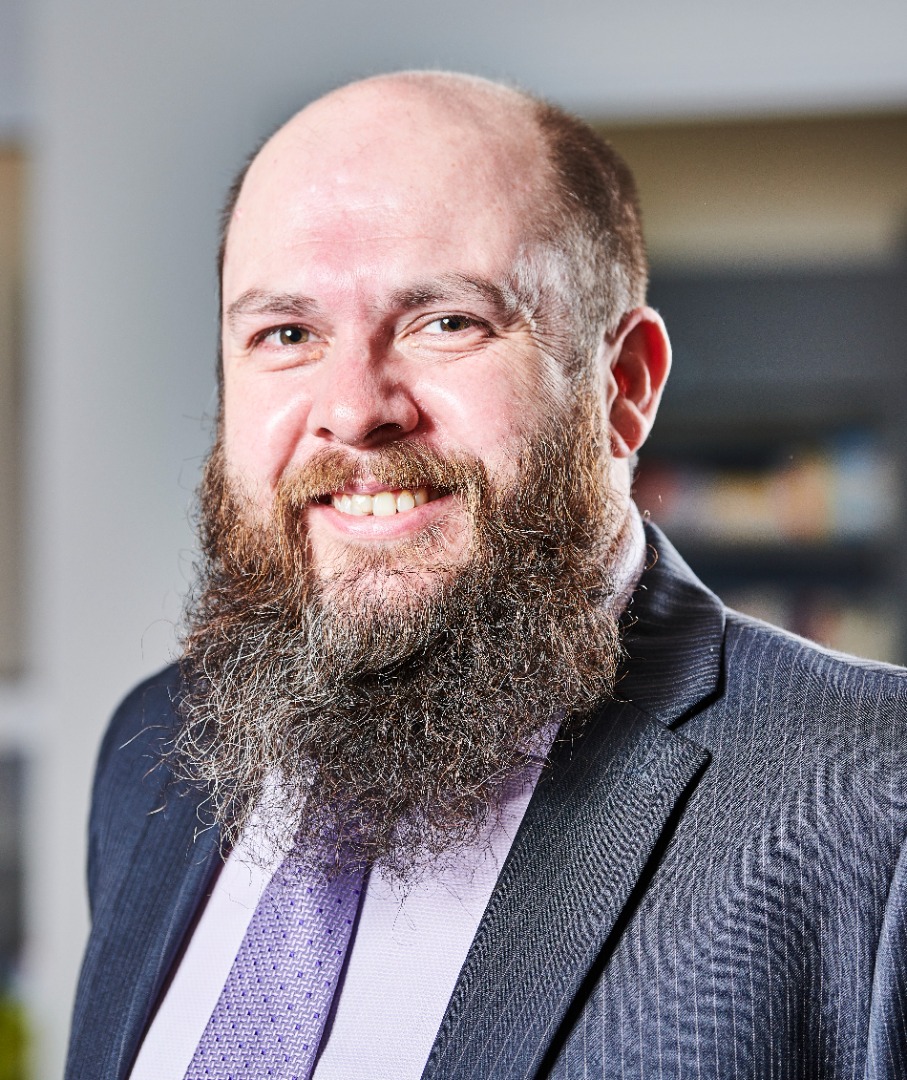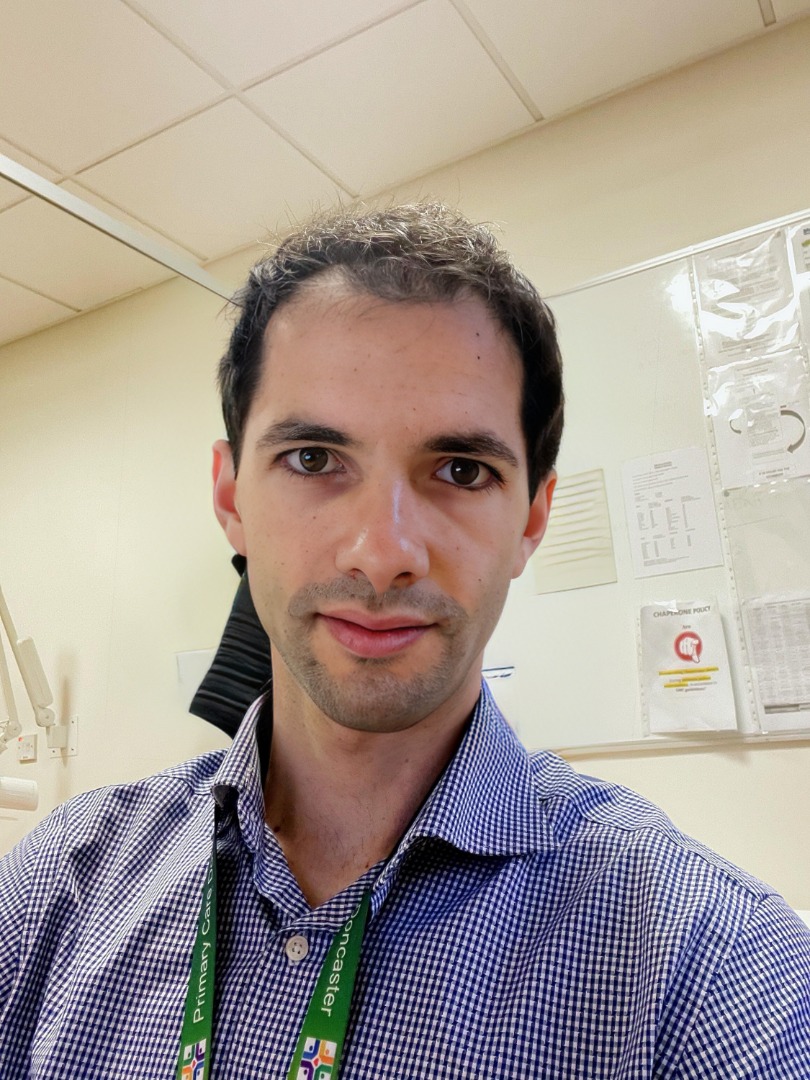Case studies - international recruitment

Hasina Aziz
Clinical lead podiatrist
Case study
Hasina Aziz: Clinical Lead Podiatrist
Hasina is an internationally-qualified podiatrist from South Africa who moved to the UK and has progressed her career in the at-risk foot and leadership and management within the NHS.
Motivation to move to the UK
I qualified as a podiatrist in January 2008 in South Africa. I researched careers as my mom had suffered from problems in her legs and feet. I was successfully accepted onto the degree and had to move 1400km away from home to pursue this as there was and still is only one podiatry school in the whole of Africa. I met my British husband while he was in Cape Town and three years later we got married and I moved to the UK to start a new chapter in my life.
However, once here I saw so many career opportunities and all the positives made me overlook the poor weather factor as well as having none of my family around.
Challenges with HCPC registration and driving.
I applied for HCPC registration in September 2009 and due to them having to liaise with the University and clashing term times this took 5-6 months. I eventually received this in the post in February 2010. Whilst waiting for this to come through I started taking driving lessons as most podiatry jobs required clinicians to do domiciliary visits. I successfully passed whilst waiting to get registered.
I then applied for professional registration which was a simple and quick task. The next challenge was looking for jobs within the NHS as this was the path I wanted to take.
Challenges in getting a job in the UK
At the time I applied for jobs near where I was living (North West) and at first applied for five and made it to the interview, but I was rejected. When I asked for feedback, there was a clear trend. They all said the same thing “The only thing letting you down is you have no NHS experience.” At this point I felt let down, demotivated and showing signs of depression.
This went on for a month and in total I applied for 15 jobs and was rejected by all 15, giving the same reason.
My husband and I then made the choice that to move forward I should register with locum agencies, and I paid for several DBS checks with various agencies. Soon after, I got a phone call asking if I would locum for a month in the South and I jumped at the opportunity.
I was a locum for nine months in total and did this around the country which was challenging but at the same time gave me that important NHS experience I was initially lacking.
This allowed me to apply for a job in Kent which I thankfully got. I stayed there for over 10 years and worked my way up the band ladder from 5, 6 and eventually a 7. When starting this role, I lived in hospital accommodation which gave my husband enough time to sort out a job transfer and also allowed us to save money for a deposit on our first home.
Negatives of working in the UK - racism
I would be lying if I said there are no negatives. However, the one thing I would like to highlight is that though we would not want race/religion to impact recruitment, it still does.
As a person of colour and growing up in Apartheid I thought coming to a first-world country like the UK I would not experience racism. Until very recently I have been asked by service users and colleagues “Why did you not stay in your country and work? Or why don’t you go back to your country.” I even attended an interview just two years ago and the minute I walked in I could tell from my experience that the panel’s body language and tone changed when they saw me. Whilst this may be an assumption, I will add that someone who has been through this will be able to identify these behaviours.
Positives of working in the UK
- Fantastic opportunities to progress in your career.
- NHS supports training and helps clinicians identify training needs/ areas and give staff protected time to complete the targets set out via appraisals.
- Once in employment the support you get is fantastic concerning mentoring and training
- Podiatry as a profession is growing in appreciation and respect
- Job satisfaction within the NHS is phenomenal.
- Excellent NHS pension scheme which reduces stress when thinking ahead
- The increase in integrated working has evolved which positively impacts patient care and outcomes.
- Equal pay and the fact that pay is something which is regularly reviewed and challenged.
- As an individual, there are numerous ways to positively improve your knowledge/skill within either NHS/private sector.
- Extended maternity leave
- Flexible working is also a massive positive for anyone with other commitments and the fact that you are in your right to request this (most organisations have a flexible working policy)
Experiences I have gained within the NHS and how my role has progressed
I have had so many opportunities to progress within my career. I started as a generalist and was able to focus on a specialism once I knew what that was. I have had so many positive experiences in MDT working which I know if I were still in South Africa I would not get. I was an inpatient Diabetes Podiatrist during my early days then progressed to wound Specialist working in the Community and MDT Foot clinics. I have gained years of experience in the Vulnerable at-risk foot and have now progressed into a managerial Clinical Team Leader role which is very well supported in addition to my clinical role.
Long term goal
If the opportunity arises, I would love to use my skills and the knowledge I have gained in a practical way to support students undertaking the Podiatry degree to ensure the quality of students who qualify are of a high standard.
I hope that sharing my story will highlight the issues and look at ways to support international recruits and help to reduce their stresses and provide constant reassurance.
Recommendations for podiatrists looking to work in the UK
For anyone coming over to the UK, I would strongly advise you to look at the practicalities of relocation and ensure the right support structure is in place to help make the journey as seamless as possible with minimal financial risk.
Lastly, I would like to add, that every individual's journey is different so it is genuinely what you make of it and what your end goal is. I am hopeful that anyone reading this will feel inspired to take that plunge: “If I could do it, so could you!”
Hard work, determination and support in my opinion is the key to any successful journey

Ben Bullen
Head of Education and Professional Development, Royal College of Podiatry
Case study
Ben Bullen: Head of Education and Professional Development, Royal College of Podiatry
Ben is an internationally-qualifed podiatrist from Australia who has develped his clinical, education, leadership and research portfolio at a national level during his time in the UK.
Motivation to move to the UK
I moved to Cambridge in 2007 with my ex-wife who had secured a post-doctoral position there. I was working in a diabetes specialist capacity at this time, contributing to amputee rehabilitation, chronic wound, diabetes foot and falls and balance multidisciplinary services. It was a most enjoyable role and lifestyle but the draw of living in the UK was also strong. While you may think Australians find the UK cold, proximity to Europe and our national wanderlust mean that warmer climes are not difficult to access.
Finding work in the UK
Podiatrists were and are in hot demand in Australia, but I hadn't truly appreciated the impact that the financial crisis and the beginning of the 'decade of austerity' were having on NHS services at the time I arrived. Finding a job was not difficult but I did have to travel from Cambridge to Norwich each day, quite different from the short tram ride I had become accustomed to. Even seasonal train tickets were extortionate by Australian or, indeed, European standards. While my fixed-term, full-time, AfC Band 7 role subsequently became permanent, post-doc biomedical scientist positions are notoriously short-term, and so I moved again, this time to Edinburgh.
I wonder if external factors, like in my example, may play a role in the recruitment and retention of international recruits. It may not be the job or the location for the podiatrist but possibly their partner. There are far more options for both parties in London, of course, but I can see this being an issue in more rural areas. In terms of acclimatising to the culture in the UK and the National Health Service, I took a financial hit, but my work continued to be interesting and rewarding in other ways. While I'm not one for 'ex-pat' events, I have made great friends and worked with fabulous colleagues over the years. I've taken up opportunities to study, research, teach and lead on areas I am passionate about and am proud to now be the Head of Education and Professional Development for The Royal College of Podiatry.
Research in the UK
During my time in the UK, I was also able to pursue a research career. I held a formal Advanced Practitioner (Clinical Research) role at the New Royal Infirmary of Edinburgh, where I contributed to several diabetes foot research projects, including multi-centre, randomised controlled trials. I was also able to complete a Professional Doctorate in Person-centred Practice at Queen Margaret University, focussing on Charcot Foot Health Literacy. Such opportunities for research are another strong draw to the UK for internationally trained podiatrists, such as myself.

Evy Cailliau
Internationally qualified podiatrist
Case study
Evy Cailliau: Internationally qualified podiatrist
Evy moved from Belgium to the UK as an internationally qualified podiatrist. To achieve HCPC registration and meet the UK standards she undertook stand-alone courses in nail surgery and local anaesthesia at the University of Huddersfield to top up her existing qualifications. She then undertook her Masters degree in the theory of podiatric surgery while working for the NHS.
My motivation to move to the UK and the differences between Belgium and the UK
The motivation to continue my study within the UK was due to personal reasons. For over two years I travelled to and from the country and I eventually chose to move over to the UK. There are also many differences between the UK and Belgium in terms of training, career, and life opportunities.
In my opinion the UK university system was considerably more supportive and interactive, and I had a good experience. On the other hand, the course fees are higher for the UK courses so having a higher budget allows for a lot more support for its students. Unlike the UK, Belgian podiatrists are traditionally self-employed with a focus on routine care and the provision of orthotics. As a qualified podiatrist you can choose to work in foot surgery (assisting), and in ‘high-risk wound care’ although both are in less demand, so opportunities were greater in the UK.
My adjustment to moving to the UK
Coming from living in Brussels, a busy capital city, there were lots of things that took time for me to adjust to. I moved to Sheffield which was different both culturally and in terms of usual dietary offerings which I had to adjust to. However, the charm of both the people and the nearby national parks won me over very quickly. After all, I had fallen in love with a Sheffield lad two years before my move to the UK. I will never forget the first time a bus driver called me ‘love’! Neither will I forget the first time I tried to hug Jack's friends and they recoiled! (Yes, I'm a hugger). It is my experience that total strangers in the UK are a lot more courteous to each other as opposed to Belgians. But Belgian friends will show a lot more physical affection in hugs and kisses. One on each cheek is a must! Although the number differs depending on where you’re from.
Why Podiatry and why the UK?
I was very interested in podiatry, but I also considered a career as either a dietitian or an art therapist.
I chose the UK as my base because my long-term partner was from here, but also because it presented good prospects, and I was offered a chance to work in an area with high standards with additional skills to what I had acquired in Belgium.
How did my training go in the UK?
I had my original qualification in Belgium and had to align with UK standards which meant I had to complete my local anaesthesia and nail surgery annotation courses. Teaching styles in the UK are much more interactive than they are in Belgium which worked well for me.I then carried on my training while working in the NHS and undertook a Masters degree which I loved, although, studying whilst working was challenging at times I found it provided me with a very in-depth understanding and appreciation of the broad range of subjects.
What did I find challenging?
I found the HCPC application lengthy, and I was regularly asked for ‘additional information’ and needed to keep phoning the HCPC for updates. I benefited from family support and motivation during this process which took about six months. Having to top up my existing qualifications I then made a list of all universities that offered nail surgery and local anaesthesia modules. I found the University of Huddersfield team so helpful, my tutor found me a study group that supported me and I was so grateful. As soon as I got my grades this was passed on to the HCPC and this process was then very quick.
I didn't find driving to be an issue too much; yes it was different, but I got used to it rather quickly.
Applying for my first role in the NHS
Getting my first UK job went smoothly. I did not find interviews a problem. I started in NHS Rotherham where I worked for six months until a position closer to home in the NHS in Sheffield became available. I stayed with the Sheffield NHS Trust for my whole time in the UK, moving up the career bands when I was eligible to apply for it. I enjoyed my time in the NHS. I found them to be very supportive and motivating.
I completed my MSc part-time whilst continuing employment. After completing this course, I got promoted to a specialist MSK podiatrist under a company called ‘physio works’ within the same NHS Trust. I loved working there.
How do I feel the process could be improved?
The HCPC's communication in the first six months could have been better and consistency with the team managing your application would have made the process smoother.
Scope of practice and multidisciplinary team working in the NHS in the UK
The NHS can create specialisations of scope, but I felt my MSc kept my skills up and propelled me into promotion. I think podiatrists with an area of interest wishing to progress in their chosen scope would benefit from the support that is offered to you and the opportunity for growth is there.
I gained more access to multi-disciplinary teamwork after completing my MSc and began working closely with the physiotherapists in the MSK team. During my honorary surgery contract, I enjoyed working under the podiatric surgeon’s supervision and alongside the practice nurses.

Jose M San-Roman-Sirvent
International podiatrist
Case study
José M San-Roman-Sirvent: International podiatrist
José is an international podiatrist from Spain who gained BSc (Hons) Podiatry in the UK. He has extended his scope through Podiatric Surgery theory training and is now a First Contact Podiatrist (FCP) in primary care using the skills gained through his Masters degree and clinical experience.
Podiatry career in the UK
I began my career in 2015 after graduating with a BSc in Podiatry and working at an NHS trust. I later pursued an MSc in the Theory of Podiatric Surgery, which encouraged me to seek shadowing opportunities at local surgical units. During this time, I worked as an honorary staff podiatrist for the local podiatric surgery team for six months, honing my skills and observing clinical duties in both outpatient and theatre sessions. I continued to seek shadowing opportunities, which proved valuable in observing different skill sets among podiatric surgeons, consultants, and members of the multidisciplinary team.
Skills gained through advancing practice
I gained many skills from the MSc in Theory of Podiatric Surgery, which equipped me with the various skills needed for advanced practice. I believe it's not only valuable as a career pathway in podiatric surgery but also helps anyone wanting to expand their knowledge and skill set or pursue a career as an FCP or Advanced Clinical Practitioner (ACP).
Skills and knowledge from MSc for advancing practice:
- The Anatomy for Podiatrists module helped me appreciate the importance of understanding the structure and function of the foot and ankle. Not only was I exposed to cadaver dissection in this module, but I have been fortunate to have attended several other cadaver dissection events (mainly through my pursuit of the podiatric surgery career route). Gaining such a detailed understanding of the anatomy of the foot has helped me perform more accurate clinical assessments which in turn helps me properly diagnose and treat foot-related problems.
- The Podiatric Mechanics module provided me with knowledge in biomechanical assessment, which is helpful in first-contact practitioner roles in primary care as a large part of the caseload is MSK. Foot biomechanics is closely linked with podiatric surgery as you need to understand normal and abnormal foot function, so one naturally gains valuable knowledge and skills in MSK through continued exposure to podiatric surgery training.
- Research Project: This module provided me with skills such as research design, data collection and analysis. Through conducting a research project, I also gained skills in formulating research questions, carrying out a literature search, and critically appraising the literature (strengths and limitations).
How my current role benefits from my skillset
In my current role as an FCP, it's important to work with other professionals and departments and arrange referrals and investigations to ensure appropriate interventions.
Thus, I feel I gained a lot of these skills through other modules of the MSc, such as:
- Diagnostic Investigations and Imaging, which helped me gain an understanding of the principles of diagnostic investigations, including laboratory and radiological investigations. This is essential whether you work in secondary care or primary care since pathology requests/bloods are part of the day-to-day work. Through these modules, I also have gained skills in interpreting imaging, mainly x-rays, which is useful for any advanced clinical practitioner role.
- Medicine and Pathology: this module provided me with a broad understanding of the pathophysiology of various medical conditions that can affect the lower limbs and feet. This module prepared me with the necessary knowledge and skills to identify red flags (Charcot foot, diabetic foot ulcer or ischaemic complications, DVT, etc.) which is key to any FCP role as patients are not 'cherry-picked' and is thus essential to be able to screen for red flags.
Overall, the MSc degree and shadowing experiences exposed me to various clinical scenarios and presentations and equipped me with a diverse set of skills. Carrying out detailed clinical assessments, diagnosing and treating foot-related issues, and identifying and managing medical conditions affecting the lower limbs and feet. Being in the UK has enabled me to progress in these areas. I feel this experience and level of training have been instrumental in enabling me to secure a job and succeed in my role as a First Contact Podiatrist.

Jared Green
SpR Podiatric Surgery
Case study
Jared Green - SpR Podiatric Surgery
Jared is an internationally-qualified podiatrist from South Africa who progressed through post-graduate training and study in Podiatric Surgery in the UK.
Motivation to study or work in the UK
I qualified as a podiatrist in South Africa in 1999. I planned to travel the world using the UK as my base and progressed my skillset and training in the UK to my current post as a Specialist Registrar in Podiatric Surgery.
Differences in training between South Africa and the UK
It is over 20+ years since qualifying and since arriving in the UK. I carried out my undergraduate training in South Africa, which was to a good level. For the first two years we shared lectures with our medical counterparts, and we had hospital rotations with orthopaedics and in A&E.
As I progressed through post graduate training in the UK, I found that the UK training was far superior. Podiatric surgery is a great asset for the podiatry profession and unfortunately this is not offered in South Africa…. yet.
I undertook my post graduate training (MSc) in the UK. Overall, the experience has been very good. Throughout my training, lecturers, university administrators and NHS consultants have always been eager to help and willing to impart knowledge. Indeed, many consultants give their spare time freely to help with learning.
Career opportunities
There are greater career opportunities both in the private and public health sectors in the UK. Podiatry within the public health sector is well established in the UK, and subsequently there is greater scope to further your career and enhance your skills and training.
Working and studying in the UK challenges and barriers
Concening studying, I found that I needed to improve my use of the English language, improving the expression of thought as well as precision and articulation of ideas. I have found although we share a common language, understanding is not always guaranteed. I have also found the need to alter my tone and body language when talking as it can often be misconstrued as aggressive or arrogant where no such intention is implied. This I believe is more of a cultural difference and one I have had to adapt to.
Securing work in the UK
I have never had a problem securing work. The interviews have always been straightforward, and I have never felt them to be unfair or biased. Interview technique is similar internationally in my opinion, I feel you should know the organisation, know the job description and requirements, and try to get a feel of the corporate culture.
I advise any international podiatrist coming to the UK to Locum for the NHS first. You get to meet a lot of people, work for different trusts and make good contacts and friends. You also get a good understanding of care requirements, working in the NHS and are often invited to learning events.
Life in the UK
I have been lucky in making good friends, having a family, settling well in the UK and have had a satisfying career so far.
Scope, MDT working and advancing practice within the NHS
Since my time in the UK, I have developed contacts and shadowed in clinics including haematology, rheumatology, orthopaedics, diabetic clinics, radiology, pain clinics, anaesthesiology, physiotherapy, tissue viability even doing joint home visits with district nursing. This I feel has made me a well-rounded clinician. However, I love the MSK side of podiatry, and I was lucky to have been given a locum post at the beginning in MSK. I was able to learn and hone my skill which naturally led me to want to pursue surgical training.
Since then, my MDT work involves working alongside diabetes and MSK teams and medics and a range of AHPs. I feel this is a strength of working in the UK with access to this range of professionals, their knowledge, access to surgical training and progression opportunities with training and education.
NHS support, pensions and training opportunities in the UK
The NHS pension is very good as the government covers the short fall regardless of market activities. Training opportunities have been freely available when requested however I was doing a lot of locum work at the beginning of my surgical training and so most of my surgical training was self-funded. Nevertheless, even as a locum I was often offered training opportunities in the NHS for which I am very grateful.
Long-term goals
I would like to gain my consultancy in the NHS and “give back” with training, support and mentoring. I would also like to take my experience back home to South Africa and help under privilege communities.

Poorvi Sharma
International student
Case study
Poorvi Sharma - International student
Poorvi is an international student who travelled to the UK from India to study and work as a podiatrist. She is building her clinical and research portfolios within the NHS and hoping to progress into podiatric surgery.
Motivation to study podiatry in the UK
I knew I had a passion for diabetes since my childhood, but I wanted to explore other options such as oncology. As I investigated career options more podiatric surgery became my ultimate ambition. While I was looking for opportunities abroad, the UK was my first choice because it has good relations with commonwealth countries. It will be flexible for me if I am looking to move in the future. It is an English-speaking country, so this was easy for me to understand and relate to for my course.
The differences in training between India and UK
I believe podiatry is still a developing field in medicine in India whereas in the UK it is more advanced and you are supported with training in the NHS. The major difference was the hands-on practice and being able to work as an autonomous practitioner.
I chose Huddersfield because of the quality of the course and the support I would get going forward for podiatric surgery. In addition to the standard of the course I was blessed with amazing tutors and life-changing experiences which I am very grateful for.
My training at a UK-based university
I found my training from the tutors and my peers extremely supportive. It was very well structured with a good scope of practice; the large University clinic helped me put my theory into practice and develop my clinical skills.
Challenges or barriers to jobs
There were some barriers to jobs such as understanding the needs of the service user and the transition from a student to a new graduate. These were nothing more than any of my peers experienced.
I have been very fortunate in job opportunities, but I did make sure to do my research and analyse my strengths and weakness before the interviews. I believe this could be improved with more support during the transition period from a student to a new graduate to meet the standards expected for the job role such as preceptorship.
I applied for three jobs originally and got offered two roles.
Why I stayed in the UK to work?
I stayed in the UK mainly because of the opportunities and the NHS. As I am still growing in my career the UK was the best option for me to learn and grow at the same time.
Also, the people here have been very inclusive considering I am from an international background. This has been one of the most important reasons I stayed as I feel this is my home away from home.
There are many post-graduate opportunities to learn and work at the same time which gives me flexibility with my work, and I feel I have a good social and work-life balance here.
NHS experience and multi-disciplinary team working
- I have developed clinical decision-making skills as I upgraded my training
- I have opportunities for research projects for my continuous professional development and building on my portfolio, including being involved in the audit which has enabled me to see the difference we make in patients’ day-to-day life and understand evaluations of practice
- Working in acute settings for the NHS has added to my understanding of the importance of a multidisciplinary team working alongside specialist nurses, diabetes consultants, vascular surgeons, and radiologists
- Working with specialist consultants I have had opportunities to shadow different procedures for a better understanding of the biomechanics of the procedure and how it will impact on treatment long-term
- I have had opportunities to be involved in radiological and haematological investigations which has enabled me to put theory into practice and I have a better understanding of X-rays and the importance of early intervention
- Within the NHS I have had the opportunity to work with psychologists and see how important mental health is for patients’ conditions
- I have learnt practical skills including total contact casting for acute and chronic Charcot foot.
Support within the NHS
I have found amazing NHS support starting from my preceptorship to my current acute specialist role and am eager to develop my scope further within the NHS.
The NHS Pension is set out to be one of the best in the UK hence being an employee in the NHS I feel lucky to be a part of it.
My long-term goals
My goal is podiatric surgery which I am working towards and trying my best to seek as many opportunities as possible to begin this career path.

Matt Cichero
Consultant Podiatric Surgeon Great Western Hospital
Case study
Matt Cichero - Podiatric Surgeon, Great Western Hospital
Motivation to come to the UK
The surgical training program in Australia requires various rotations so in 2008 I spent three months rotating in the UK and the US as part of my podiatric surgery training. In 2010 I funded a further trip to Swindon. Great Western Hospital wanted to run a pilot study to see whether we could reduce the length of inpatient stay of patients admitted with diabetic foot disease. Given my previous experience in Singapore in the diabetic foot I took on this role as the coordinator for the pilot. Within six months outcomes were positive, with further extensions and a permanent post advertised I was successful at this post and settled into my role. But I was also keen to complete my surgical training.
Podiatric surgery training in Australia and the UK
Part of my Australian surgical training was accepted in the UK. I had to progress through the Completion Certificate in Podiatric Surgery Training (CCPST) process. I think those years of CCPST were beneficial anyway for me in developing skills at the consultancy level. I could see many opportunities in diabetic foot limb salvage compared to Australia in terms of podiatric surgery. 99.9% of it is private and elective surgery in Australia, so I could see myself developing an expertise that I just would not have had in Australia.
How was the VISA process?
I came to the UK on an Ancestry Visa, with English heritage on my mum’s side, so this process was quite simple for us.
What were the challenges in this new way of life?
The hardest parts were not seeing my family and not surfing every weekend! The trade-off was bringing up my own family and being so close to Europe, exploring beautiful parts of the world and learning to ski! We’ve had some beautiful holidays exploring Spain particularly the north of Spain, we just love France and then Italy; we love going to the lakes in Italy and I still get to surf in the Southern parts of England.
Multidisciplinary team working and extending the scope of practice
Multidisciplinary team working (MDT) does exist in Australia, but only really in a hospital setting. I think coming to the UK and getting experience within this setting on rotation would be beneficial for any podiatrist or podiatric surgeon. Ideally, if you have ancestry or dual citizenship the process is quite simple; other short-term visas such as Youth Mobility Scheme (18-30’s) (two years) or standard Visitor VISA (six months) would support this. If you’re a podiatrist extending your scope or doing surgical training, this country has such a wide variety of areas in which you could specialise: injection therapies, first point of contact, ultrasound training and other imaging, increasing knowledge in the high-risk foot, limb salvage and preservation, developing in advancing clinical practice with opportunities to reach consultant grade in podiatric surgery and podiatric medicine, can all add to a varied and interesting career path for you. Progression within your career in leadership, public health, or research as well as clinical areas can be supported by spending time in the UK.